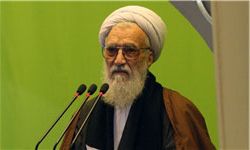Senior Cleric Kermani Urges Muslim Nations to Maintain Unity

 Tehran’s provisional Friday Prayers Leader Ayatollah Mohammad Ali Movahedi Kermani blamed internal rifts and disputes for the existing problems in the Muslim states, and asked Islamic nations to maintain unity.
Tehran’s provisional Friday Prayers Leader Ayatollah Mohammad Ali Movahedi Kermani blamed internal rifts and disputes for the existing problems in the Muslim states, and asked Islamic nations to maintain unity.
Addressing a large and fervent congregation of worshippers here in Tehran on Friday, Ayatollah Movahedi Kermani stressed the importance of preserving Muslim unity and said the main issue in countries such as Egypt, Syria and Iraq is internal disputes.
He pointed out that enemies seek to turn Muslims against each other but if Muslims are united they should have no fears or concerns.
As regards development in Syria, Ayatollah Movahedi Kermani said the the Israeli regime and their allies are turning to negotiation due to failure in Syria.
The Iranian cleric noted that the Syrian situation has reached a good stage saying, Iran’s diplomacy has been influential in resolving the issue.
Syria has been experiencing unrest since March 2011 with organized attacks by well-armed gangs against Syrian police forces and border guards being reported across the country.
Hundreds of people, including members of the security forces, have been killed, when some protest rallies turned into armed clashes.
The government blames outlaws, saboteurs, and armed terrorist groups for the deaths, stressing that the unrest is being orchestrated from abroad.
The US and its western and regional allies have long sought to topple Assad and his ruling system. Media reports said that the Syrian rebels and terrorist groups have received significantly more and better weapons in recent weeks, a crime paid for by the Persian Gulf Arab states and coordinated by the United States.
The US daily, Washington Post, reported in May that the Syrian rebels and terrorist groups battling the President Bashar al-Assad’s government have received significantly more and better weapons in recent weeks, a crime paid for by the Persian Gulf Arab states and coordinated by the United States.
The newspaper, quoting opposition activists and US and foreign officials, reported that Obama administration officials emphasized the administration has expanded contacts with opposition military forces to provide the Persian Gulf nations with assessments of rebel credibility and command-and-control infrastructure.
Opposition activists who several months ago said the rebels were running out of ammunition said in May that the flow of weapons – most bought on the black market in neighboring countries or from elements of the Syrian military in the past – has significantly increased after a decision by Saudi Arabia, Qatar and other Persian Gulf states to provide millions of dollars in funding each month.







